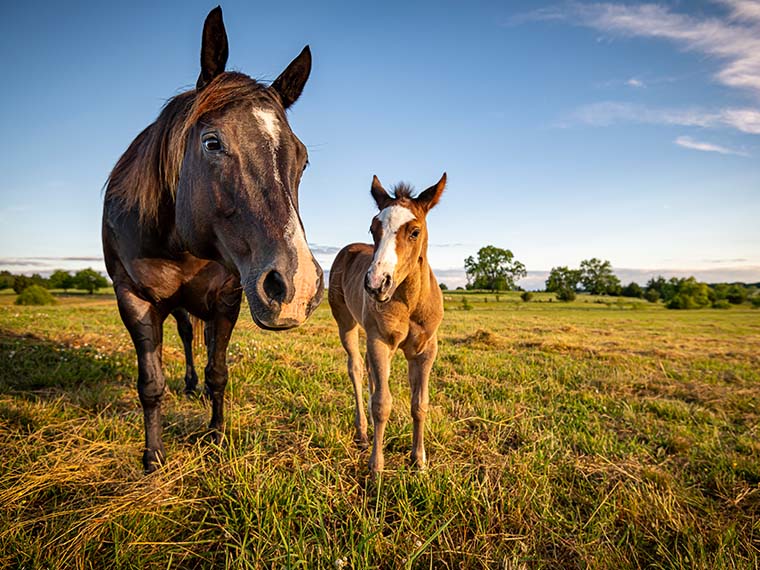The information presented on this page may be dated. It may refer to situations which have changed or people who are no longer affiliated with the university. It is archived as part of Mississippi State University's history.
AMID THE ROLLING HILLS that encompass the MSU H. H. Leveck Animal Research Center lies one of the university's hidden treasures - the MAFES Equine Unit. The nearly 130-acre unit serves as quarters for 80 horses.
The MAFES Equine Unit is home to the MSU Equestrian Team, research, breeding, and multiple university courses including Introduction to Horsemanship and Horse Management. Sixty five of the horses are owned by the university, while 15 are leased from private owners. According to Ashley Glenn, facilities supervisor, the MSU program is known for its variety of uses, a factor that sets it apart from similar programs at other universities.
"The unit serves as a teaching and research laboratory, demonstration facility, and provides sporting and extracurricular activities through numerous horse-centric organizations," Glenn said.
Unit research encompasses reproduction and nutrition studies. An upcoming study on exercise physiology will use a therapy plate, better known as a TheraPlate, to counter chronic inflammation conditions and injuries in horses through vibration. The unit has also been involved in a study to examine the relationship between the development of equine knowledge and feelings of emotional safety in college students (see our story on page 6).
The MAFES Equine Unit prides itself on its breeding techniques and quality, which further enhances the teaching program. To reduce issues stemming from keeping a herd of stallions and limitations with genetics, the unit has transitioned to using artificial insemination practices.
"All of our breedings are donated from phenomenal bloodlines," Glenn stated. "The insemination process is conducted by students training to be veterinarians in the MSU College of Veterinary Medicine. The offspring then stay with us until they are two years old, aiding us in numerous classes."
A large portion of the horses bred at the MAFES Equine Unit are bred for a select discipline. Moving away from having a strictly running-bred herd as in the past, offspring now specialize as reiners, cow horses and cutters, with the exception of a few all-around horses. Focusing on these disciplines allows Glenn and Dr. Clay Cavinder, animal and dairy sciences professor, to better market the equine athletes.
Though the change to these select disciplines is fairly recent, Glenn is proud of the quality of the offspring they produce, mentioning the superiority compared to other universities.
"While this shift in our breeding program is fairly new, I believe we surpass a lot of other universities in the quality of our offspring," Glenn stated.
To Glenn, the improvement in quality is one of her biggest accomplishments in her four years at MSU. This substantial growth is the product of their daily routine, which Glenn admits can alter day-to-day.
"Horses get fed at 6 a.m. by our interns, then my assistant and I come in around 7 a.m. every morning. We have a plan for each day, but horses are unpredictable so it can easily change," Glenn said. "Stalls get cleaned twice a day, and practices for the equestrian team are scattered throughout the day. On Tuesdays our farrier comes to shoe the horses, and Fridays are set aside to complete any missed tasks."
Of course, schedules and plans change depending on the season as well. In the spring, horses are being vaccinated and often foaling. Breeding season, to no surprise, is their busiest time as they are moving mares around, checking for pregnancy and readiness to breed.
The changes and improvements the MAFES Equine Unit have made over the years have been significant, but Glenn has a few more in mind she knows will allow for even more success and recognition.
"A major goal for us is to add a covered arena-it would benefit every aspect of our equine unit. We have very high aspirations, and I'd like for us to be one of the best programs in the nation," Glenn added.

